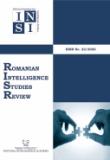DEFINING HYBRID WARFARE. THE RUSSIAN EXPERIENCE: AN ANALYSIS OF PROPAGANDA MECHANISMS AND THEIR IMPORTANCE IN DEVELOPING FOREIGN POLICY
DEFINING HYBRID WARFARE. THE RUSSIAN EXPERIENCE: AN ANALYSIS OF PROPAGANDA MECHANISMS AND THEIR IMPORTANCE IN DEVELOPING FOREIGN POLICY
Author(s): Alexandra POPESCU (ANGHEL), Teodora DobreSubject(s): Political Philosophy, International relations/trade, Security and defense, Military policy, Peace and Conflict Studies
Published by: National Institute for Intelligence Studies
Keywords: hybrid warfare; propaganda; disinformation; foreign policy; Russian Federation;
Summary/Abstract: In the past few years, the Russian Federation has become a central point on the security agenda of the most important international actors due to its aggressive foreign policy, proven by its latest actions (the illegitimate annexation of Crimea, the actions conducted in Syria and so on). However, by comparison with the Cold War era, Russia has developed new mechanisms to gain power and influence on regional and international level, demonstrating that it can and has the willingness to become the powerful actor that used to be before the Cold War and the fall of the Communist Block by building an empire able to stop the expansion of the North-Atlantic Treaty Organization. Thus, the aim of this paper is to analyse (through instruments like discourse and content analysis and literature review) the methods used by the Russian state to conduct remote wars, without taking responsibility for its actions. Moreover, the article will try to identify the role of the Russian propaganda machine in developing Kremlin’s foreign policy, as well as in defining the concept of hybrid warfare as a new form of confrontation.
Journal: Romanian Intelligence Studies Review
- Issue Year: 2020
- Issue No: 23
- Page Range: 65-88
- Page Count: 24
- Language: English

